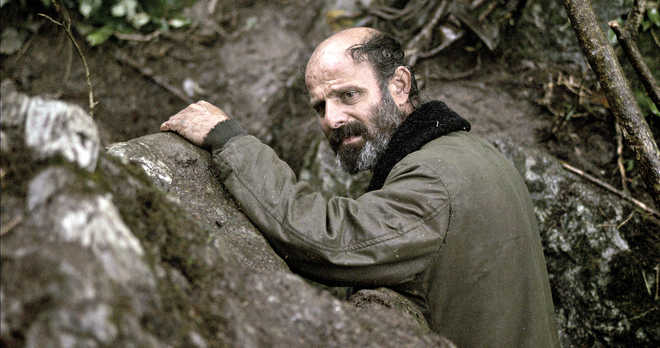India slips off awards radar
Saibal Chatterjee
The 47th International Film Festival of India (IFFI), which concluded in Goa recently, was a veritable feast of quality cinema. Such was the quality and range of the films presented over nine days that cineastes had no reason not to feel satiated.
Kicking off with the Indian premiere of the late Polish master Andrzej Wajda’s marvellous swansong, Afterimage, the festival unspooled a wide array of gems from across the world. But for all cinematic riches that were on offer, the event culminated in disappointment for India.
At the awards ceremony on the closing day, the host country drew a blank in the three competition sections. This despite the fact that India had a quartet of films vying for the trophies.
This was the first time in seven years that Indian filmmakers had to return empty-handed from IFFI Goa: a clear reflection of the declining fortunes of the Indian Panorama section, the festival’s much-vaunted showcase of the nation’s best films.
This year’s Panorama lineup clearly wasn’t good enough to throw up films that could vie on an equal footing with the 13 international films that made it to the principal Competition section.
The top prize of IFFI 2016 — the Golden Peacock — was won by Reza Mirkarimi’s Iranian film Daughter, which competed against 14 titles, including two from India. Both the Indian films in the main Competition were made by debutants — G. Prabha’s Ishti (Sanskrit) and Manas Mukul Pal’s Colours of Innocence (Bengali). Neither made any impression on the jury headed by the Czech filmmaker Ivan Passer.
Three other Competition films garnered prizes from Passer’s jury — The Throne (South Korea, Special Jury Award), Rauf (Turkey, Best Director) and Mellow Mud (Latvia, Best Actress). The Best Actor prize went to Farhad Aslani for his performance in Daughter, making it an impressive double whammy for the Iranian entry.
In the two other competitive sections that IFFI hosted this year — Centenary Award for the Best Debut Feature (seven films) and the ICFT-UNESCO Gandhi Award (eight films), the Indian contenders — Ananya Kasaravalli’s Harikatha Prasanga and T.S. Nagabharana’s Allama, both made in the Kannada language — met the same fate.
The ICFT-Unesco Gandhi Award went to the Turkish film Cold of Kalandar, while the Best Debut Film prize was bagged by the Chilean-Argentinian film Rara, directed by Pepa San Martin.
India’s poor IFFI showing this year contrasts with how films from the host country have fared in the festival since 2010, when veteran Bengali director Goutam Ghose’s Moner Manush bagged the Golden Peacock. The same year, another Bengali film, Kaushik Ganguly’s Arekti Premer Galpo (Just Another Love Story), won the Special Jury Award.
Two years later, in 2012, Gurvinder Singh’s Punjabi film Anhey Ghorey Da Daan won the festival’s top award. Coming in the wake of Salim Ahamed’s Malayalam film Adaminte Makan Abu (Abu, Son of Adam) winning the Special Jury Award in 2011, Gurvinder Singh’s triumph completed a remarkably rewarding span of three years for India at IFFI.
That was by no means the end of the happy run. The year 2013 was especially successful for India, with two Bengali films, Kamaleswar Mukherjee’s Meghe Dhaka Tara, a stylised biopic about Indian cinema legend Ritwik Ghatak, and Kaushik Ganguly’s Apur Panchali, the story of the adult life of the child actor in Satyajit Ray’s epochal Pather Panchali, garnering a runner-up Silver Peacock and Best Director prize, respectively.
The last time India was blanked out in the IFFI awards was 2009. But between 2010 and 2015, the country received at least half a dozen prizes, including the Special Jury Award in 2014 for first-time director Shrihari Sathe’s Marathi film, Ek Hazarachi Note.
The same year, India’s Dulal Sarkar was adjudged the best actor for Kaushik Ganguly’s Bengali film, Chotoder Chobi, which told the love story of a dwarf.
So what really went wrong this year? One has to look at the composition of the Indian Panorama programme to understand why India did not throw up any worthy award contender. Time was when the Panorama was known to bring together a bunch of films that were global in outlook and substance.
Today, commercial films like Bahubali, Bajirao Mastani and Sultan have muscled their way into this once-hallowed section, sending the qualitative mean plummeting. To make matters worse established masters like Adoor Gopalakrishnan and Buddhadeb Dasgupta, both of whom had important films in Panorama contention this year, had to sit out.
In fact, this year’s Panorama left out some other remarkable films, Ruchika Oberoi’s Venice prize winner Island City, Bauddhayan Mukherji’s minimalist The Violin Player, Sanal Kumar Sasidharan’s Ozhivu Divasathe Kali (An Off-Day Game) and T.V. Chandran’s Mohavalayam. Had these titles made the cut, India might not have been left out in the cold by the IFFI jury.
The Panorama’s increasing disconnect with the broad trends of world cinema is being increasingly felt by those that have the interests of Indian cinema at heart. This year’s fiasco is a manifestation of the decline in the weight of the section that once held up the cream of Indian cinema for global assessment. That is no more the case.










